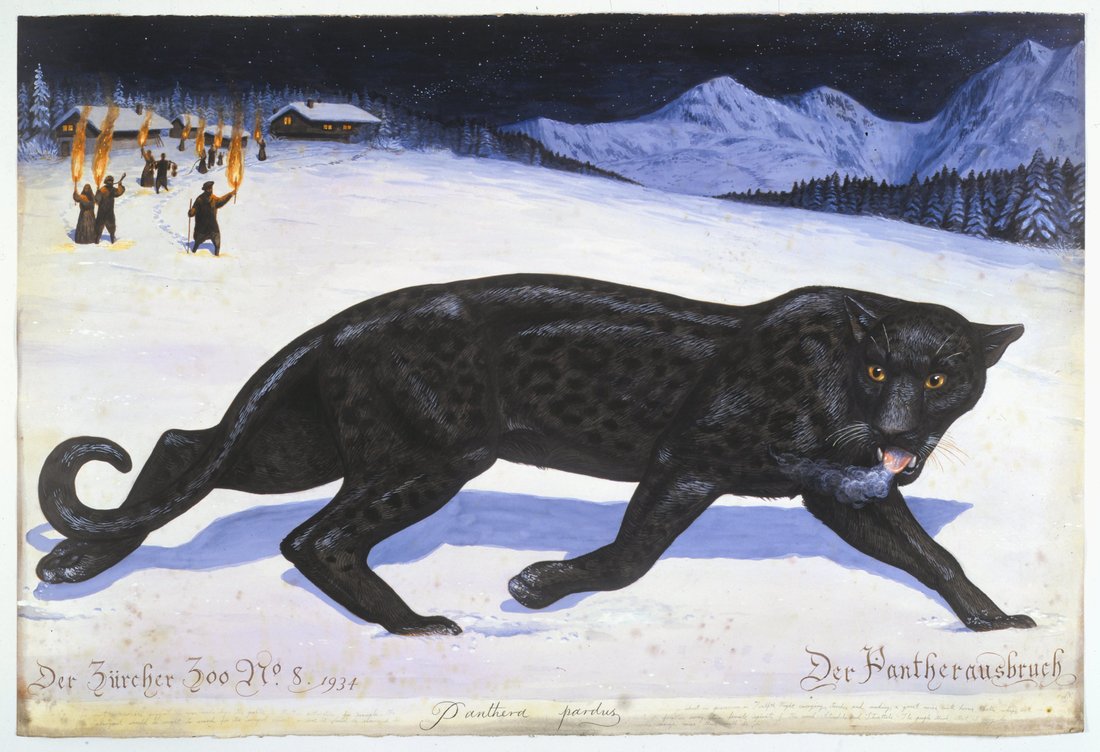|
The Panther’s Tale
In 1934 a female black panther escapes from the Zürich Tiergarten and survives through two months of a Swiss winter, before being shot for food by an itinerant labourer in the mountains near Saint Gallen. The animal’s escape and disappearance quickly become sensational news. During the time the panther is at large, the authorities receive hundreds of reports from people claiming to have seen the animal, some from the most far-flung corners of the country and beyond. There is never a confirmed sighting. Suspicious tracks in the snow always turn out to be those of dogs. A certain religious sect asserts that the panther is demonic and should be exorcized by a pastor from their church. A clairvoyant from Paris travels to Zürich and offers her help to the searchers, claiming she’s had a vision of the panther hiding in a cave of ice high up on a glacier. The clairvoyant is politely asked to return home. The panther herself is aware of none of this. She survives by way of her instinctual stealth and her learned distrust of human beings. She hunts mice, voles, and hares in the snow-mantled forest, as far from human habitation as possible, and makes herself a den under the roots of an immense, ancient stone pine, from which she emerges only when hunger drives her. Her time in captivity has does nothing to lessen her innate distrust of humans, but where they are found, there is always food. She leaves her den and prowls slowly down the mountain, further into their territory, until she comes to a small graveyard ringed by trees. Hunkered in the concealment of a thorn bush at the edge of the burial ground she can smell a freshly dead human, somewhere close by. Eating things she has not killed herself is not in her nature, but surviving is. Still, she must be careful. She remembers how the humans first caught her. How they had a thing made of wrong-smelling vines that fell on her so that she couldn’t get away. She has seen the work of their fire sticks and understands that it means death. She will not move until she’s certain there is no hidden danger here. Then humans come. There are many of them, some carrying a thing made of pieces of tree. They carry the thing to a hole in the ground. They set it down. One of them utters that strange flat barking that only humans make. Some make other noises, like the cries and whimpers the panther heard from other caged creatures around her in the place the humans kept her before she escaped. Most of the humans leave. Two stay behind and cover the hole with earth. Then they leave, too. The panther waits until it is well past dark and then she creeps into the burial ground. She reaches the fresh grave and slowly, with many pauses to listen, digs away the loose soil. She claws and bites at the flimsy thing made of wood and two of its pieces move apart and now she can get at what’s inside. The panther hauls it out and drags it to her hiding place to eat. The dead human is small. It was weak and sickly, the panther knows when she tastes its flesh, which is dry and joyless fare. But it will sustain her. Later a fall of large wet snowflakes patter softly on the bare branches, on the panther’s fur, on the damp earth. The panther would rest after her meal, but now she can hear them returning. Many of them. She can see their angry fires flicker through the trees. The panther gathers herself and springs away. She is here, now, a dark shape against the snow, her breath the ghost of what she cannot tell us. She is still at large, in the place we find ourselves exiled from by our torches, our words. We can only glimpse her through a thicket of brush strokes, at the edge of a great silence. Thomas Wharton Thomas Wharton's novels and stories have been published in Canada, the US, the UK, France, Italy, Japan, and other countries. His first novel, Icefields, received the 1996 Commonwealth Writers’ Prize for Best First Book (Canada and Caribbean Division), and won the Grand Prize at the 1995 Banff Mountain Book Festival. His collection of stories, The Logogryph, was shortlisted for the International Dublin Literary Award.
0 Comments
Your comment will be posted after it is approved.
Leave a Reply. |
The Ekphrastic Review
COOKIES/PRIVACY
This site uses cookies to deliver your best navigation experience this time and next. Continuing here means you consent to cookies. Thank you. Join us on Facebook:
July 2024
|




